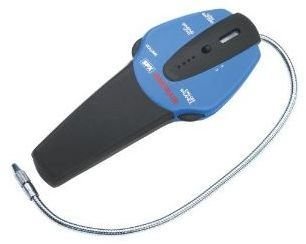Detecting Freon Leakage in Air Conditioning Units
Freon is trademark name given to refrigeration chlorofluorocarbons manufactured by the DuPont organization. The chlorofluorocarbons are known by the trademark name because they started its production and made it widely used in refrigeration industry. Today Freon is being replaced by hydro-chlorofluorocarbons that cause less harm to the Ozone layer. Air conditioning units often face the problem of Freon leakage, which might cause severe health hazards. Freon leakage will render the air conditioning unit useless because it is the Freon that cools down the external air and keeps the room temperature constant. Freon leakage means that your AC will behave as an expensive cooling fan. Depending upon your budget and leak size, different air conditioner leak detection solutions are available in the market.
Detecting AC Freon Leakage
One of the best ways to detect Freon leakage is to make use of handheld detection devices. These are advanced electronic devices, fitted with Freon sensors, which will sense excess presence of the gas in your room or office space. Semiconductor sensors detect the gas presence and the corresponding concentration of the Freon gas is displayed on the screen. There are many audible and audio-visual leakage sensing devices available on the market. One such device is the Robinair Leak Detector, which makes use of corona discharge technology and can sense as low as 1/2 ounce of gas leak per year.
Electronic leak detectors are suitable for detection of not only CFCs but HFC and HCFCs as well. In most of the cases, leakage occurs at the regions of low pressure. The low pressure hose, which lies between the evaporator and compressor, often fails because of changing pressure conditions and a Freon leak starts. Another popular electronic leak detection device is made by <strong>Tek-Mate</strong> that works fine even under damp conditions. It is capable of detecting all types of refrigeration gases. These electronic leak detectors have a limit and they cannot detect very small concentrations of the gas leak.
An alternative solution to this problem is to change your hose pipes, rubber joints, and seals frequently. Every air conditioning unit comes with a user manual, which clearly mentions lifetime of the accessories and hose pipes. Changing from time to time ensures that you are properly handling your device. Minor cracks often damage the whole unit if they go unnoticed.
The conventional method of detecting Freon leaks is using a portable burner with a low flame. Low flame burners do not harm components of the AC unit but if there is any Freon leakage going on, the flame color will change to green or bluish green instantaneously. It is a slow method and does not give reliable results.
Liquid Tracers can also be used to detect Freon leaks and they give precise results. Fluorescent dyes are used with coolant and the system is allowed to run for some time. The dye remains at all the leaked spots and one can easily locate the damaged or malfunctioning regions. The dye can be removed with the help of cleaning solutions. In case the leakage is very small; one can use ultraviolet lamps to detect the leaked areas.
Bubble Leak Method is also known as soap bubble solution and it uses a high pressure inert gas to detect the leak. Gas is blown over the hose pipes and AC components in a controlled environment. Pressure bubbles start to emerge from the leaking surface. This method is used when the leak size is huge or easily noticeable with the naked eyes.
Another major cause of Freon leaks is very high temperature variations. Evaporation coils fail in such cases as they find it difficult to handle rapidly changing pressure readings. Replacing the evaporation coil can fix a Freon leak problem, but it is going to put an excess burden on your pocket. In worst cases, your copper tubing might fail you, and then you have no other option but to replace the whole line set.
Health Hazards
Freon gases are not fatally harmful but they can pose serious threats to the health of heart patients, kids, and pet animals. Freon is a heavy gas and it settles down on the floor, which means kids and pet animal will be the first one getting in contact with the gas. For heart patients, the gases create respiratory problems and exert excess pressure on the normal functioning of the heart. Very high concentrations of Freon gas will result in cardiac arrhythmia and palpitations. So, health-wise also, repair and maintenance of air conditioning leakage is very important.
References
Spygas Freon, https://software.crowconsupport.co.uk/Manuals/Portable/Spygas/Spygas%20Freon.pdf
OEHHA; Technical Support Document: ToxicologyClandestine Drug Labs/ Methamphetamine: Charles Salocks, PhD, DABT and Karlyn Black Kaley, PhD, DABT; “Freon”, https://oehha.ca.gov/public_info/pdf/TSD%20Freon%20Meth%20Labs%2010%278%2703.pdf
Image
Robinair Leak Detector, https://www.amazon.com/gp/product/images/B000JFL8Q6/ref=dp_image_0?ie=UTF8&n=15684181&s=automotive
